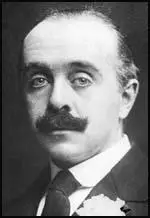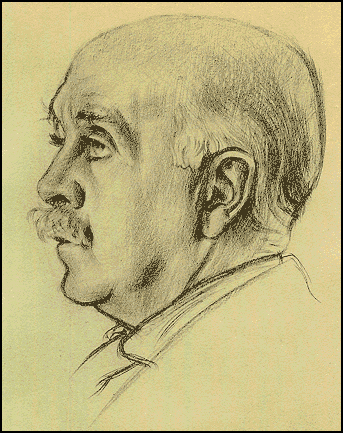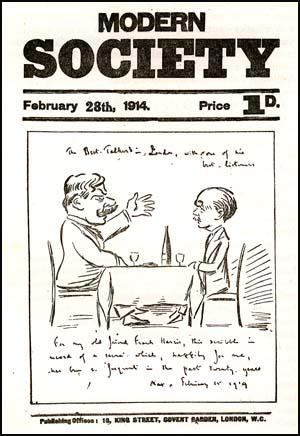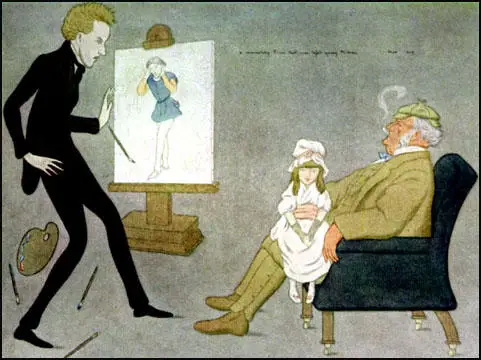Max Beerbohm

Henry Maximilian (Max) Beerbohm was born at 57 Palace Gardens Terrace, London, on 24th August 1872. His father, Julius Ewald Edward Beerbohm (1810–1892), had come to England in about 1830 and established himself as a successful corn merchant.
In 1885 he entered Charterhouse School. He later wrote: "My delight in having been at Charterhouse was far greater than my delight in being there… I always longed to be grown-up!". Beerbohm began drawing caricatures of his teachers and of public figures, while at school.
Beerbohm met Oscar Wilde in 1888. Wilde's biographer, Richard Ellmann, has claimed: "Beerbohm was quick and clever: Wilde taught him to be languid and preposterous.... Beerbohm admired, learned, and resisted; aware that Wilde was homosexual, and anxious not to to follow him in that direction, he drew back from intimacy. He was to caricature Wilde savagely; this was ungrateful, but it was a form of ingratitude, and of intimacy, into which other followers of Wilde lapsed."
Beerbohm won a place at Merton College in 1890 to study classics. While at university he became friends with Oscar Wilde, Robert Ross, Alfred Douglas and William Rothenstein. He continued with his drawing and in 1892 The Strand Magazine published thirty-six of his caricatures. He later wrote that this success provided "a great, an almost mortal blow to my modesty".
The publisher, John Lane, invited Aubrey Beardsley and his friend, Henry Harland, to produce a new quarterly, called The Yellow Book. The first edition was published in April, 1894. The reviewer in The Times, pointing to the cover that had been produced by Beardsley and wrote of its "repulsiveness and insolence". The drawings by Beardsley created a great deal of controversy and because of this, the first edition of 5000 copies sold out in five days.
John Lane, was pleased with the success of the book and invited Beardsley and his friend, Henry Harland, to produce a new quarterly, called The Yellow Book. The first edition was published in April, 1894. The reviewer in The Times, pointing to the cover that had been produced by Beardsley, wrote of its "repulsiveness and insolence". The drawings by Beardsley created a great deal of controversy and because of this, the first edition of 5,000 copies sold out in five days.
The author of Max Beerbohm: A Kind of Life (2002) has argued: "Max's reputation as a caricaturist was if anything higher than that as an essayist. In the late 1890s his drawing had also developed: it became more subtle, more intricate, more understated, the general softening of tone owing much to the addition of light colour washes, something Will Rothenstein had urged on him. Max himself remarked that as he got older (on into his late twenties) he found that his two arts... were growing more like each other... Max's was one of those rare talents equally distinguished in two arts. His sister arts sometimes come together in those of his drawings with more or less lengthy captions."
Beerbohm's close friend, Oscar Wilde was arrested and charged with offences under the Criminal Law Amendment Act (1885). The trial of Wilde and Alfred Taylor began before Justice Arthur Charles on 26th April, 1895. Of the ten alleged sexual partners Queensberry's plea had named, five were omitted from the Wilde indictment. The trial under Charles ended in jury disagreement after four hours. The second trial, under Justice Alfred Wills, began on 22nd May. Douglas was not called to give evidence at either trial, but his letters to Wilde were entered into evidence, as was his poem, Two Loves. Called on to explain its concluding line - "I am the love that dares not speak its name" Wilde answered that it meant the "affection of an elder for a younger man".
Wilde attempted to defend his relationship with what became known as the "Love that dare not speak its name" speech: "It is that deep, spiritual affection that is as pure as it is perfect. It dictates and pervades great works of art like those of Shakespeare and Michaelangelo, and those two letters of mine, such as they are. It is in this century misunderstood, so much misunderstood that it may be described as the Love that dare not speak its name, and on account of it I am placed where I am now. It is beautiful, it is fine, it is the noblest form of affection. There is nothing unnatural about it. It is intellectual, and it repeatedly exists between an elder and a younger man, when the elder man has intellect, and the younger man has all the joy, hope and glamour of life before him. That it should be so the world does not understand. The world mocks at it and sometimes puts one in the pillory for it."
Max Beerbohm, was in court at the time and wrote to his friend, Reginald Turner: "Oscar has been quite superb. His speech about the Love that dares not tell his name was simply wonderful and carried the whole court right away, quite a tremendous burst of applause. Here was this man, who had been for a month in prison and loaded with insults and crushed and buffeted, perfectly self-possessed, dominating the Old Bailey with his fine presence and musical voice. He has never had so great a triumph, I am sure as when the gallery burst into applause - I am sure it affected the jury."

Beardsley invited Beerbohm to contribute essays and caricatures to the journal. He also wrote for other publications, and he drew caricatures for Pick-Me-Up, Sketch, and the Pall Mall Budget. He also published, under the imprint of The Bodley Head, a collection of essays, entitled The Works of Max Beerbohm (1896). Leonard Smithers, who was a thirty-four-year-old ex-solicitor who sold old books, prints, and pornography from a shop in Arundel Street, off the Strand, published a collection of his drawings, Caricatures of Twenty-Five Gentlemen (1896).
Beerbohm became very close to William Rothenstein. He later wrote: "He (Rothenstein) wore spectacles that flashed that flashed more than any other pair ever seen. He was a wit. He was brimful of ideas... He knew everyone in Paris. He knew them all by heart. He was Paris in Oxford... I liked Rothenstein not less than I feared him; and there arose between us a friendship that has grown ever warmer, and been more and more valued by me, with every passing year."
Beerbohm, whose elder half-brother, Herbert Beerbohm Tree, was one of London's foremost actor–managers, took a keen interest in the theatre. Frank Harris appointed Beerbohm as the drama critic of The Fortnightly Review. In 1898 he began to write a regular column for The Saturday Review, a journal recently purchased by Harris. He held the post for the next twelve years.
Beerbohm was a great supporter of the work of George Bernard Shaw. Although he did not share Shaw's socialist beliefs, described him as "the most brilliant and remarkable journalist in London." He also considered him a great playwright. He was especially complimentary about Man and Superman (1902), which he considered to be his "masterpiece so far". He described it as the "most complete expression of the most distinct personality in current literature".
He also liked John Bull's Other Island (1904): "Mr Shaw, it is insisted, cannot draw life: he can only distort it. All his characters are but so many incarnations of himself. Above all, he cannot write plays. He has no dramatic instinct, no theatrical technique... That theory might have held water in the days before Mr Shaw's plays were acted. Indeed, I was in the habit of propounding it myself... When I saw John Bull's Other Island I found that as a piece of theatrical construction it was perfect... to deny that he is a dramatist merely because he chooses for the most part, to get drama out of contrasted types of character and thought, without action, and without appeal to the emotions, seems to me both unjust and absurd. His technique is peculiar because his purpose is peculiar. But it is not the less technique."
After a series of failed relationships Beerbohm married an American actress, Florence Kahn on 4th May 1910, at the Paddington register office. Enid Bagnold saw them together just after they got married: "She wore her bracelets outside her black net gloves. I was thrilled by the way the top of Max's head steamed in a spiral." William Rothenstein commented: "Max supports matrimony with a charm and grace which is the despair of other husbands."
Beerbohm's biographer, N. John Hall, has pointed out: "He quit his post at the Saturday Review, and went to live the rest of his life in the Villino Chiaro, a small house on the coast road overlooking the Mediterranean at Rapallo, Italy. Max and his wife seem to have had a thoroughly happy life together. There has been speculation that he was a non-active homosexual, that his marriage was never consummated, that he was a natural celibate. The fact is, not much is known of Max's private life."
Beerbohm did over forty caricatures of George Bernard Shaw during his lifetime. He did not find Shaw's appearance attractive. He mentioned his pallid pitted skin and red hair like seaweed. "The back of his neck was especially bleak; very long, untenanted, and dead white". He admitted that Shaw's political views did not help: "My admiration for his genius has during fifty years and more been marred for me by dissent from almost any view that he holds about anything."
Beerbohm held an exhibition of his work at the Leicester Galleries in April 1911. The Times, reviewing the show, claimed that he deserved the title of "the greatest of English comic artists". Beerbohm later defined caricatures as "the delicious art of exaggerating, without fear or favour, the peculiarities of this or that human body, for the mere sake of exaggeration... The whole man must be melted down, as in a crucible, and then, as from the solution, be fashioned anew. He must emerge with not one particle of himself lost, yet with not a particle of himself as it was before."
Beerbohm told William Rothenstein that he was partly responsible for his success: "As you will know, your belief in me has always been a great incentive to me to believe in myself; and your creative, suggestive, fertilizing mind has enormously helped me from time to time. I remember, for example, that it was you who, at Oxford, first told me that I ought to try washes of water-colour - things of which at that time I supposed myself to be quite incapable at the age of ninety. And it was you who made me see the difference between line-y drawing and drawing that had an unjournalistic grace. And it was you, later, whose advice helped me to keep within my own little spiritual way of expression and not to try for external accuracies. And - but I won't enumerate the heaps of ways in which, to me, as to many other more important persons, you have been ballast and inspiration."
In 1911 Beerbohm published to great critical acclaim his only novel, Zuleika Dobson. It has often featured in the list of the 100 best novels ever published. This was followed by a collection of seventeen parodies of contemporary writers, A Christmas Garland (1912). The Saturday Review claimed that "He (Beerbohm) has not only parodied the style of his authors, but their minds also".
In February 1914 Frank Harris was sent to Brixton Prison for contempt of court following an article on Earl Fitzwilliam, who had been cited as a co-respondent in a divorce case. His assistant editor, Enid Bagnold, went around to Beerbohm's flat to ask for his help. "I rung his doorbell, and sent up a message as urgent as I could make it by the maid. He was not dressed, but came down in a wonderful dressing-gown, and as he listened his two very blue eyes were serious with anger, though his eyebrows, his mouth, and the rest of his charming face would not go any great lengths. He was angry enough to dress very quickly, and came with me, carrying his cane."
As well as helping editing Modern Society, that week he drew a cartoon for the front cover. It showed Beerbohm having dinner with Harris. Underneath he wrote: "The Best Talker in London, with one of his best listeners".

Beerbohm wrote: "The Best Talker in London, with one of his best listeners".
Beerbohm's next book, Seven Men (1919), was a collection of short stories. One of his greatest fans was Virginia Woolf. She wrote to Beerbohm: "If you knew how I had pored over your essays - how they fill me with marvel - how I can't conceive what it would be like to write as you do!" Beerbohm himself was greatly influenced by the work of Henry James. He told Frank Harris that he "gets effects through those elaborate sentences that you could hardly get otherwise."
Beerholm had further exhibitions at the Leicester Galleries in 1923 and 1925. The New York Herald Tribune published a review which argued: "In terms of aesthetics Mr Beerbohm is not a draughtsman at all; he has a delicate sense of color, decorative felicity… but he has never learned to draw… For his own purposes, however, his drawing is consummate… He has a genius for likenesses; better than anyone else he understands how to convey the attitudes of his subject… Add to these humor without venom and refined imagination and you have lifted caricature into the realm of art."

Beerholm drew caricatures of Oscar Wilde, William Rothenstein, George Bernard Shaw, Thomas Hardy, W. B. Yeats, Lytton Strachey, John Ruskin, William Morris, Aubrey Beardsley, John Singer Sargent, Augustus John, William Gladstone, Benjamin Disraeli, Dante Gabriel Rossetti, Henry James, Joseph Conrad, James Whistler, George Meredith, Theodore Roosevelt, Woodrow Wilson, Queen Victoria, Edward VII, George V and Edward VIII. In 1930 he gave up caricaturing: "I found that my caricatures were becoming likenesses. I seem to have mislaid my gift for dispraise. Pity crept in. So I gave up caricaturing, except privately".
In 1939 George VI offered him a knighthood. To the surprise of his friends he accepted the honour. After the ceremony, he wrote to a friend: "My costume yesterday was quite all right… Indeed, I was (or so I thought, as I looked around me) the best-dressed of the Knights, and quite on a level with the Grooms of the Chamber and other palace officials. I'm not sure that I wasn't as presentable as the King himself - very charming though he looked."
After the death of his wife in 1951, Elisabeth Jungmann, became his secretary and companion. He married her just before his death at Rapallo on 20th May 1956.
Primary Sources
(1) Max Beerbohm, letter to William Rothenstein (13th March, 1913)
As you will know, your belief in me has always been a great incentive to me to believe in myself; and your creative, suggestive, fertilizing mind has enormously helped me from time to time. I remember, for example, that it was you who, at Oxford, first told me that I ought to try washes of water-colour - things of which at that time I supposed myself to be quite incapable at the age of ninety. And it was you who made me see the difference between line-y drawing and drawing that had an unjournalistic grace. And it was you, later, whose advice helped me to keep within my own little spiritual way of expression and not to try for external accuracies. And - but I won't enumerate the heaps of ways in which, to me, as to many other more important persons, you have been ballast and inspiration.
(2) The New York Herald Tribune (7th February, 1926)
Treason is a strong word, but not too strong, rather too weak, to characterize the situation which the Senate is the eager, resourceful, indefatigable agent of interests as hostile to the American people as any invading army could be, and vastly more dangerous: interests that manipulate the prosperity produced by all, so that it heaps up riches for the few; interests whose growth and power can only mean the degradation of the people, of the educated into sycophants, of the masses toward serfdom.
